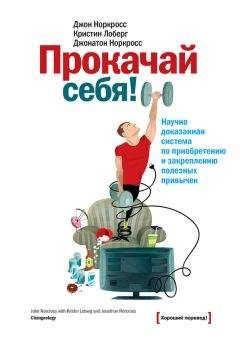Кристин Лоберг - Прокачай себя! Научно доказанная система по приобретению и закреплению полезных привычек

Помощь проекту
Прокачай себя! Научно доказанная система по приобретению и закреплению полезных привычек читать книгу онлайн
Перед тем как мы расстанемся, пожалуйста, выполните еще один, последний тест для самопроверки, чтобы оценить свое владение навыками по поиску и пробному сеансу у специалиста по психическому здоровью, который будет соответствовать вашим потребностям и целям. Вряд ли вы действительно полагали, что я отправлю вас в путь без окончательной оценки ваших навыков.
Проверьте себя: выбор психотерапевта, подходящего именно вамОтветьте на следующие вопросы «да» или «нет». Вы действительно:
…отбросили мысли, что обращение за помощью к профессионалу означает несостоятельность? _________
…воспринимаете лечение как естественное дополнение к вашей работе по изменению? _________
…узнали об образовании и квалификации основных специалистов по поддерживанию психического здоровья? _________
…составили список лицензированных специалистов в области психического здоровья в вашем районе? _________
…попросили рекомендации у большого количества друзей и медицинских работников? _________
…не полагаетесь на рекламу в интернет-справочниках? _________
…изучили психотерапевтов из списка, чтобы узнать, кто из них подойдет вам больше? _________
…позвонили выбранным специалистам и получили необходимую информацию (сборы, методы, расписание и т. д.)? _________
…договорились о встрече с двумя из выбранных психотерапевтов? _________
…настояли, чтобы вам показали лицензию? _________
…сказали о тех качествах, которые вам нравятся, и выбрали соответствующего психотерапевта? _________
…определили, где застряли в процессе самоизменения, и сообщили об этом выбранному психотерапевту? _________
…провели один или два пробных сеанса? _________
…задали конкретные вопросы во время первого визита, чтобы определить, действительно ли психотерапевт соответствует вашим потребностям? _________
…выбрали специалиста за его компетенцию, тепло, заботу, опыт и гибкость? _________
…выбрали того, кто соответствует цели и этапу вашего изменения? _________
…избегаете психотерапевтов, использующих дискредитированные методы лечения? _________
…убедились, что этот специалист вам нравится, вы ему доверяете и ощущаете связь с ним? _________
…оценили, ведет ли его лечение к вашей цели? _________
…много самостоятельно работаете и становитесь специалистом по самоизменению? _________
Избранная библиография
На момент выхода этой книги в печать у меня накопились сотни, если не тысячи, исследований, подтверждающих эффективность описанного здесь соответствия шагу и смены катализаторов. Как я уже говорил в начале, пятиступенчатый процесс, характеризующий науку об изменении, отражает десятилетия исследований в лабораторных и клинических условиях, которые продолжаются и по сей день. Если бы эта книга включала все опубликованные исследования по стадиям изменения, в ней были бы тысячи страниц: невозможно иначе отразить все исследования, проведенные за последние 30 лет.
Поэтому я включил сюда аннотированную библиографию, охватывающую лишь некоторые наиболее интересные опубликованные исследования, включая те, которые я упоминал.
Bandura, A. (1982). Self-efficacy mechanism in human agency. American Psychologist, 37, 122–147.
Baumeister, R. E., & Tierney, J. (2011). Willpower: rediscovering the greatest human strength. New York: Penguin.
Beck, A. T., Rush, A. J., Shaw, B. E., & Emery, G. (1979). Cognitive therapy of depression. New York: Guilford.
Begley, S. (2010, June 14). My alleles made me do it: the folly of blaming bad behavior on wonky DNA. www.thedailybeast.com/newsweek/blogs/the-human-condition/2010/06/13/my-aileles-made-me-do-it-bad-behavior-blamed-on-wonky-dna.html.
Benjamin, A. (1987). The helping interview. Boston: Houghton Mifflin.
Bike, D. H., Norcross, J. C., & Schatz, D. M. (2009). Processes and outcomes of psychotherapists’ personal therapy: replication and extension 20 years later. Psychotherapy, 46, 19–31.
Boice, R. (2000). Advice for new faculty members. Boston: Allyn & Bacon.
Borland, R. (1990). Slip-ups and relapse in attempts to quit smoking. Addictive Behaviors, 15, 235–245.
Brogan, M. M., Prochaska, J. O., & Prochaska, J. M. (1999). Predicting termination and continuation status in psychotherapy using the transtheoretical model. Psychotherapy, 36, 105–113.
Brownell, K. D., Marlatt, G. A., Lichtenstein, E., & Wilson, G. T. (1986). Understanding and preventing relapse. American Psychologist, 41, 765–782.
Burns, D. (1999). Feeling good: the new mood therapy. New York: Avon.
Carroll, K. M. (1996). Relapse prevention as a psychosocial treatment: a review of controlled clinical trials. Experimental and Clinical Psychopharmacology, 4, 765–782.
Chouinard, M. C., & Robichaud-Ekstrand, S. (2007). Predictive value of the transtheoretical model to smoking cessation in hospitalized patients with cardiovascular disease. European Journal of Cardiovascular Prevention and Rehabilitation, 14 (1), 51–58.
Cialdini, R. B. (2008). Influence: science and practice (5th ed.). New York: Prentice Hall.
Coelho, P. (1993). The alchemist. New York: HarperCollins.
Colino, S. (2001, January). The decision that changed my life. Ladies’ Home Journal, 84–86.
Corrigan, P. (2004). How stigma interferes with mental health care. American Psychologist, 59, 614–625.
Cuijpers, P. (1997). Bibliotherapy in unipolar depression: a meta-analysis. Journal of Behavior Therapy and Experimental Psychiatry, 28, 139–147.
Curry, S. G., & Marlatt, G. A. (1985). Unaided quitters’ strategies for coping with temptations to smoke. In S. Shiftman & T. A. Wills (Eds.) Coping and substance use (pp. 243–265). New York: Academic Press.
DiClemente, C. C. (2003). Addiction and change: how addictions develop and addicted people recover. New York: Guilford.
DiClemente, C. C., Prochaska, J. O., Fairhurst, S. K., et al. (1991). The process of smoking cessation: an analysis of precontemplation, contemplation and preparation stages of change. Journal of Consulting and Clinical Psychology, 59, 295–304.
Eisenberg, D. M., Davis, R. B., Ettner, S. L., et al. (1998). Trends in alternative medicine use in the United States, 1990–1997. Journal of the American Medical Association, 280, 1589–1575.
Epcot Poll. (1985). Resolutions not kept long by most Americans. Lake Buena Vista, Fla.: Walt Disney World.
Geller, J. D., Norcross, J. C., & Orlinsky, D. E. (Eds.) (2005). The psychotherapist’s own psychotherapy: patient and clinician perspectives. New York: Oxford University Press.
Gibbs, N. (2004, July 5). Made your July 1 resolutions? Time, 98–99.
Gollwitzer, P. M. (1999). Implementation intentions: strong effects of simple plans. American Psychologist, 54, 493–503.
Goodwin, D. K. (2006). Team of rivals: the political genius of Abraham Lincoln. New York: Simon & Schuster.
Greenwald, J. (1998, November). Herbal healing. Time, 61–68.
Gritz, E. R., Carr, C. R., & Marcus, A. C. (1988). Unaided smoking cessation: Great American Smokeout and New Year’s Day quitters. Journal of Psycho-social Oncology, 6, 217–234.
Hall, K. L., & Rossi, J. S. (2008). Meta-analytic examination of the strong and weak principles across 48 health behaviors. Preventive Medicine, 46 (3), 266–274.
Hatzigeorgiadis, A., Zourbanos, N., Galanis, E., & Theodorakis, Y. (2011). Self-talk and sports performance: a meta-analysis. Perspectives on Psychological Science, 6 (4), 348–356.
Isenhart, C. E. (1997). Pretreatment readiness for change in male alcohol dependent subjects: predictors of one-year follow-up status. Journal of Studies on Alcohol, 58 (4), 351–357.
James, W. (1890). Principles of Psychology. http://psychclassics.yorku.ca/James/Principles/index.htm.
Johnson, S., Prochaska, J., & Sherman, K. (2010, May). Co-variation: A promising approach to multiple behavior change interventions. Paper presented at the 31st Annual Meeting of the Society of Behavioral Medicine, Seattle, WA.
Kazdin, A. E. (2008). Behavior modification in applied settings (6th ed.). Long Grove, IL: Waveland Press.
Kessler, R., McGonagle, K. A., Zhao, S., et al. (1994). Lifetime and 12-month prevalence of DSM-III-R psychiatric disorders in the United States. Archives of General Psychiatry, 51, 8–19.
Klingemann, H., & Carter-Sobell, L. (Eds.) (2007). Promoting self-change from addictive behaviors. New York: Springer.
Kobayashi, M., Mrykalo, M. S., & Norcross, J. C. (1997, April). Slips and falls: a naturalistic study of lapses and relapses in self-initiated behavior change. Poster presented at the 68th Annual Meeting of the Eastern Psychological Association, Washington, D. C.
Koocher, G. P., Norcross, J. C., & Greene, B. A. (Eds.) (2013). Psychologists’ desk reference (3rd ed.). New York: Oxford University Press.
Krebs, P., Prochaska, J. O., & Rossi, J. S. (2011). Defining what works in tailoring: a meta-analysis of computer-tailored interventions for cancer-preventive behavior change. Preventive Medicine, 67, 143–154.
Lasser, K., Boyd, J. W., Woolhandler, S., et al. (2000). Smoking and mental illness: a population-based prevalence study. Journal of the American Medical Association, 284 (20), 2606–2610.
Levesque, D. A., Van Marter, D. E., Schneider, R. J., et al. (2011). Randomized trial of a computer-tailored intervention for patients with depression. American Journal of Health Promotion, 26 (2), 77–79.
Levy, D. A. (2009). Tools of critical thinking: metathoughts for psychology (2nd ed.). Long Grove, IL: Waveland Press.
Lilienfeld, S. O. (1998). Pseudoscience in contemporary clinical psychology: what it is and what we can do about it. The Clinical Psychologist, 51 (4), 3–9.
Lilienfeld, S. O., Lynn, S. J., & Lohr, J. M. (Eds.) (2003). Science and pseudo-science in clinical psychology. New York: Guilford.
Marlatt, G. A., & Donovan, D. M. (Eds.) (2007). Relapse prevention: maintenance strategies in the treatment of addictive behaviors (2nd ed.). New York: Guilford.
Marlatt, G. A., & Kaplan, B. E. (1972). Self-initiated attempts to change behavior: a study of New Year’s resolutions. Psychological Reports, 30, 123–131.
McConnaughy, E. A., DiClemente, C. C., Prochaska, J. O., & Velicer, W. E. (1989). Stages of change in psychotherapy: a follow-up report. Psychotherapy, 26, 494–503.
McConnaughy, E. A., Prochaska, J. O., & Velicer, W. E. (1983). Stages of change in psychotherapy: measurement and sample profiles. Psychotherapy, 20, 368–375.
Miller, E., & Marlatt, A. (1997). How to keep up with those New Year’s Resolutions: researchers find commitment is the secret of success. University of Washington study.
Miller, W. R., & Rollnick, S. (2002). (Eds.) Motivational interviewing: preparing people for change (2nd ed.). New York: Guilford.
Miller, W. R., & Tonigan, J. S. (1996). Assessing drinkers’ motivation for change: the Stages of Change Readiness and Treatment Eagerness Scale (SOCRATES). Psychology of Addictive Behaviors, 10 (2), 81–89.
Miller, W. R., Wilbourne, P. L., & Hettema, J. E. (2003). What works? A summary of alcohol treatment outcome research. In R. K. Hester & W. R. Miller (Eds.) Handbook of alcoholism treatment approaches: effective alternatives (3rd ed., pp. 13–63). Boston: Allyn & Bacon.
Mukherjee, Siddhartha. (2010). The emperor of all maladies. New York: Scribner.
Nolen-Hoeksema, S., Wisco, B. E., & Lyubomirsky, S. (2008). Rethinking rumination. Perspectives on Psychological Science, 3, 400–424.
Norcross, J. C. (2000). Here comes the self-help revolution in mental health. Psychotherapy, 37, 370–377.
Norcross, J. C. (2005). The psychotherapist’s own psychotherapy: educating and developing psychologists. American Psychologist, 60, 840–850.

























